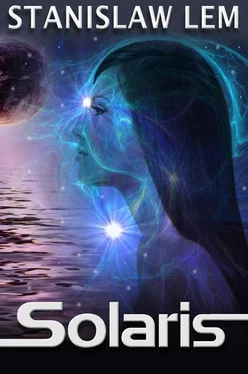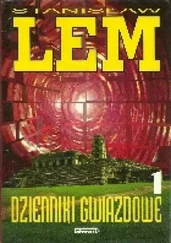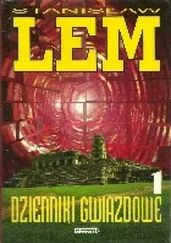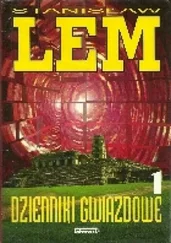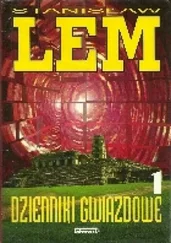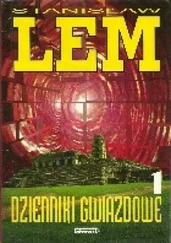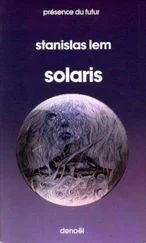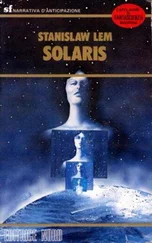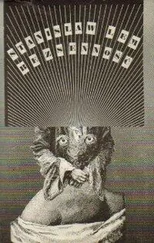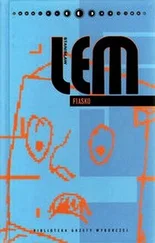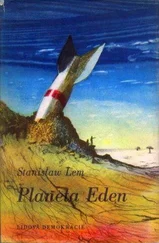I looked for some kind of window in the plastic wall, even just a chink; the idea of spying on Sartorius didn’t seem at all dishonorable to me. I wanted to put an end to conjecture and learn the truth, though I couldn’t imagine how I would understand it.
It occurred to me that the labs were lit from skylights in the ceiling, or rather in the exterior plating, and if I went outside I might be able to see in from there. To this end I’d need to go downstairs and get a space suit and oxygen tank. I stood by the stairs, wondering if it was worth the effort. The skylights were likely made of matted glass. But what other option did I have? I went down to the middle level. I had to pass by the radio station. The door was wide open. He was sitting in the armchair, in the same position I’d left him in. He was asleep. At the sound of my footsteps he stirred and opened his eyes.
“Hey there, Kelvin,” he croaked. I remained silent. “So did you find anything out?” he asked.
“Actually yes,” I replied slowly. “He’s not alone.”
Snaut made a face.
“How about that. That’s something. He has guests, you say?”
“I don’t understand why none of you will say what it is,” I put in as if casually. “I mean, I’ll be staying here so sooner or later I’ll find out anyway. So why all the secrets?”
“You’ll understand when you have your own guests,” he said. I had the feeling he was waiting for something and wasn’t in the mood to talk.
“Where are you going?” he asked sharply when I turned around. I didn’t reply. The docking bay was in the same state as when I’d left it earlier. My scorched capsule stood wide open on the pad. I went up to the spacesuit racks, but I’d suddenly lost interest in the idea of venturing out to the plating atop the Station. I spun on my heel and went down the spiral stairs to where the depositories were. The narrow corridor was cluttered with canisters and piles of cases. The walls here were made of bare metal that glinted lividly in the light. A few dozen yards and the frost-covered pipes of the cooling apparatus came into view beneath the ceiling. I traced them back. They disappeared via a thick plastic sleeve into a hermetically sealed room. When I opened the heavy door, which was two hand-widths thick and lined with rubber, a blast of cold chilled me to the bone. I shivered. Icicles hung from a tangle of snow-coated coils. Here too there were crates and capsules, under a thin layer of snow; the shelves lining the walls were stacked with cans and yellow blocks of some kind of fat packed in clear plastic. Further off, the barrel-vaulted ceiling dropped lower. In this place there was a thick curtain glittering with ice needles. I pulled it aside. A large elongated shape lay on a pallet beneath a sheet of gray fabric. I raised the hem and looked into the stiffened face of Gibarian. His black hair, with the gray streak over the forehead, lay flat against his skull. His Adam’s apple jutted upwards, breaking the line of his neck. His dry eyes stared straight up at the ceiling; a cloudy tear of ice had formed in the corner of his eyelid. The cold was so piercing I had trouble preventing my teeth from chattering. Holding the shroud up, with my other hand I touched his cheek. It was exactly like touching frozen wood. The skin was rough with stubble, which poked through in small black points. An expression of boundless disdainful patience had set on his lips. As I lowered the edge of the cloth, I noticed that on the far side of the body some elongated black beads or beans, arranged from smallest to largest, were poking out from under the folds. All at once I was petrified.
It was the toes of bare feet seen from underneath. The oval pads protruded somewhat. Beneath the crumpled edge of the shroud, pressed flat against the pallet, lay the black woman.
She was face down, as if plunged in a deep sleep. I pulled aside the sheet inch by inch. Her head, covered in small tufts of bluish hair, rested in the crook of her massive, equally black arm. The bumps of her spinal column tightened the glistening skin across her back. Her immense body showed not the slightest sign of movement. Once again I looked at the bottoms of her bare feet and I was struck by something odd: they weren’t flattened or squashed by the weight they must have had to carry; they weren’t even callused from walking barefoot, but were covered with a skin that was as thin as that on her back or hands.
I tested this impression with a touch that was much more difficult than touching the dead body. What happened then was quite incredible: her body, subjected to a temperature below zero degrees Fahrenheit, came to life and stirred. She drew up her foot like a sleeping dog when you take hold of its paw.
She’ll freeze to death in here, I thought to myself. But her body was tranquil and not especially cold. I could still feel the soft touch moving through my fingertips. I stepped back behind the curtain, let it fall, and returned to the corridor. It felt extraordinarily hot out there. Stairs led me out to right by the docking bay. I sat on a furled parachute and took my head in my hands. I felt as if I’d been beaten up. I didn’t know what was happening to me. I was shattered. My thoughts seemed to be moving along the edge of a cliff, in danger of falling off at any moment — annihilation or at least loss of consciousness would have been a unutterable, unattainable act of grace.
I had no reason to go see Snaut or Sartorius; I couldn’t imagine assembling into any kind of whole all I’d experienced, seen, touched with my own hands up to this point. The only resort, way out, explanation, was a diagnosis of insanity. Yes: I must have gone mad, immediately after I landed. The ocean had affected my brain in such a way — I’d had one hallucination after another, and since this was the case, there was no point in wasting my energy on vain attempts to solve mysteries that in reality did not exist, but instead I should seek medical assistance, call the Prometheus or another ship from the radio station, send an SOS.
At this point something happened that I scarcely expected: the thought that I had lost my mind calmed me down.
I understood only too well what Snaut had said — if in fact anyone called Snaut even existed, and I had ever spoken to him, because after all, the hallucinations could have begun much earlier. Who knows if I wasn’t still on board the Prometheus , struck down by a sudden bout of mental illness, and everything I’d experienced to this point was the product of a disturbed mind? Yet if I was sick I could get better, and that at least gave me the hope of deliverance, something I couldn’t remotely see being possible among the tangled nightmares of what I’d lived through on Solaris in the space of a few short hours.
What I needed to do, then, was to conduct some kind of logically designed experiment on myself — an experimentum crucis —which would show me whether in fact I’d gone mad and was at the mercy of phantoms created by my own imagination, or whether, however absurd and improbable they were, these experiences were in fact real.
I thought about it all as I gazed at the metal cantilever that supported the weight-bearing structure of the docking bay. It took the form of a steel mast jutting from the wall and reinforced with convex plates. It was painted willow green. In places, at a height of about three feet, the paint was coming off; it had probably been scraped by the rocket carts as they were moved that way. I touched the steel, warming it for a moment with my hand, and tapped the rolled edge of the protective casing. Was it possible for a hallucination to reach such a level of realism? Perhaps, I answered myself. After all, that was my area of specialization; I knew what I was talking about.
Читать дальше
